Woman shares heart-breaking reason her niece shares her name
At 24, having kids was the last thing on Alisi Jack Kaufusi’s mind. But then a devastating diagnosis changed her world and now this little girl is giving her hope.
QWeekend
Don't miss out on the headlines from QWeekend. Followed categories will be added to My News.
At 24, you are living out of home for the first time with your best friend in a hip inner city suburb. At 24, you are driving your shiny, new, red Honda Civic sedan that you bought proudly with your own savings. At 24, you are enjoying a promotion at work in a career you love.
At 24, you are not sitting in a gynaecological oncologist’s room being told that you have cancer. There is no place for words like “stage three’’, “aggressive’’, “ovarian cancer’’.
But this has been the devastating reality for Brisbane woman Alisi Jack Kaufusi who, at 24, with the world at her feet, had the rug pulled out from under them instead.
Jack Kaufusi, now aged 28, recalls the blur of that day in December 2017, of the sentences spilling from her doctor’s mouth but pulling only one, very unexpected word out from
it all.
In her mind, Jack Kaufusi was screaming: “Hang on, you’ve got the wrong person, I can’t have cancer, I’m only 24.”
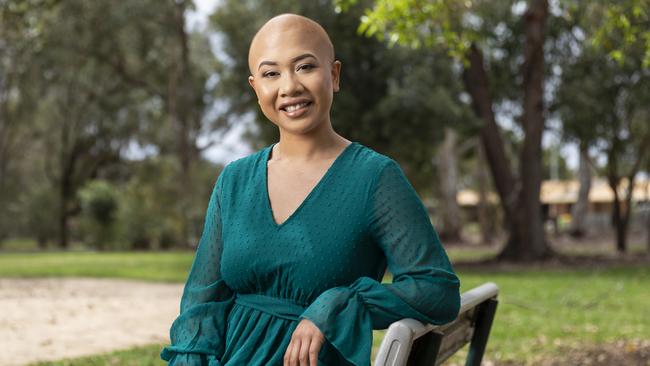
With no family history of the disease, Jack Kaufusi was working in her “dream job” as a flight attendant and had no reason to suspect she was anything but fit and healthy. Having cancer was not even in her realm of possibility.
She initially saw her GP for symptoms including irregular menstrual bleeding, bloating, pain during sexual intercourse and waking up tired even after a good night’s rest.
Less than two weeks later she underwent a full hysterectomy at Brisbane’s Mater hospital and then chemotherapy to treat the aggressive cancer that had also spread to her diaphragm, large bowel and liver. Half of her large bowel was also removed.
In April 2020 the cancer returned and again she underwent more chemotherapy and surgery to remove her spleen.
It recurred again in April this year and she is currently undergoing her third chemotherapy treatment plan with six months of a gruelling three-weeks-on, one-week-off schedule.
After four years of living with cancer, Jack Kaufusi has embraced a role in helping to spread awareness of this disease.
She is passionate about sharing her story to help raise awareness of ovarian cancer and its symptoms and seeing cancer research appropriately funded. She especially wants to educate young women to be vigilant about their health.
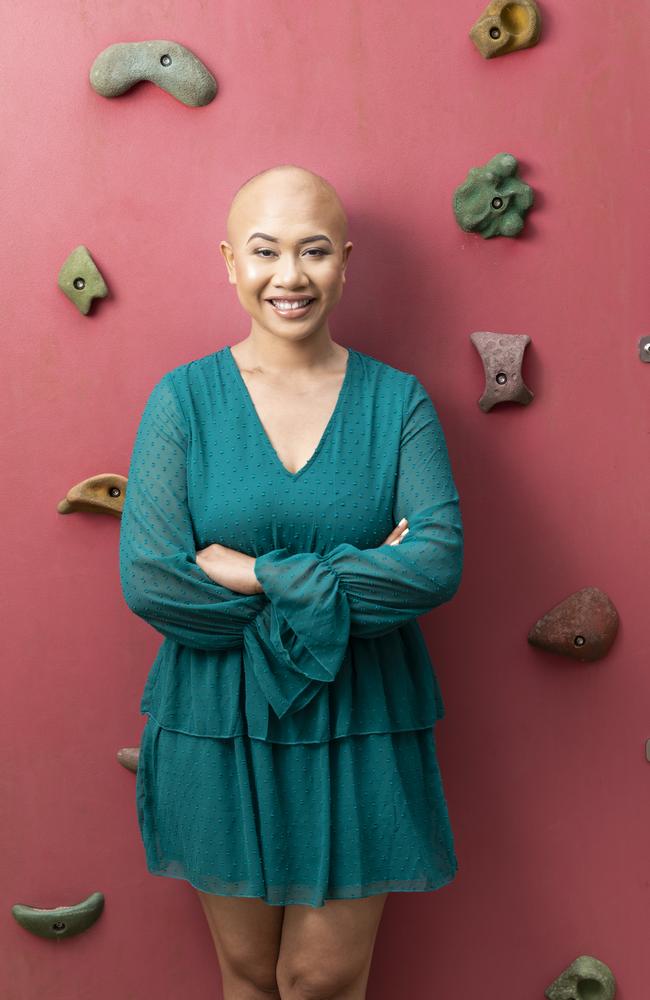
While remaining positive and hopeful, Jack Kaufusi has gradually learnt that it is impossible to be positive every day.
She now knows that cancer, aside from the physical treatment, surgery and symptoms, is mentally traumatic too.
Some days she admits to retreating to the safety and privacy of her bedroom to watch movie favourites like Forrest Gump, The Blind Side or The Hangover. These are films she has watched many times before but she finds comfort in their predictability. Watching these movies, for a short while, she knows how it will all pan out.
Ovarian cancer remains one of the deadliest women’s cancers.
Every day in Australia, four women are diagnosed with ovarian cancer, with survival rates within the first five years of about 48 per cent.
Symptoms of the disease include an increased abdominal size or persistent bloating, abdominal or pelvic pain, feeling full after eating a small amount and needing to urinate often or urgently.
Other symptoms may include changes in bowel habits, unexplained weight gain or loss, excessive fatigue, lower back pain, indigestion or nausea, bleeding after menopause or in-between periods, and pain during sex or bleeding after.
Professor John Hooper is a senior research fellow at Mater Research UQ. He leads the Cancer Cell Biology Research Group, with a particular interest in aggressive malignancies including cancers of the prostate, bowel, pancreas and ovary. He is also one of the co-leaders of the Mater Ovarian Cancer Research Collaborative (MOCRC).
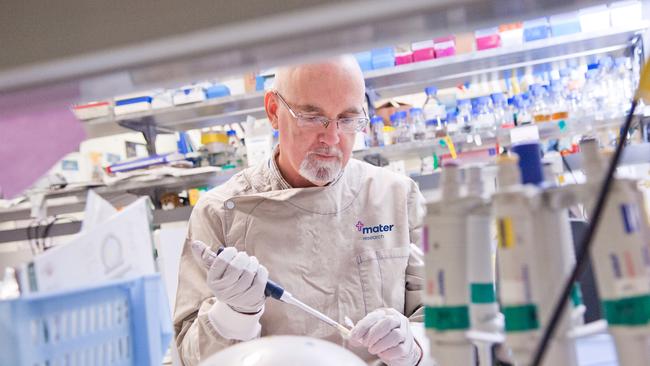
In 2020, his team were recipients of a $2m, four-year grant from the federal government’s Medical Research Future Fund (MRFF) to continue research into developing better diagnosis and treatment of ovarian cancer.
They are working on developing a new PET Ct contrast agent and new blood biomarkers. He hopes five-year ovarian cancer survival rates will improve to 60 per cent “in the not too distant future” with new genetic tests, improved therapies and increased awareness.
“One of the biggest issues with ovarian cancer is early diagnosis. It’s certainly a cancer that can take a while to diagnose,” he says.
“We have a major focus on ovarian cancer research, trying to come up with better tools so patients are diagnosed earlier and get treatment earlier and therefore have a greater chance of being cured.”
Mater operates a large ovarian cancer tissue bank, directly helping cancer researchers.
Hooper says Brisbane was last year awarded four out of eight national MRFF ovarian cancer grants, three of which “would not have come to Brisbane if not for the involvement of the Mater clinical team”.
“Without Mater, none of this happens,” Hooper says.
“Mater does all the tissue collections for research, they provide researchers with clinical expertise, support research funding applications, and help drive the researchers in directions that are more clinically relevant.
“We have tissue samples from over 800 Mater ovarian cancer patients that are available to researchers like me. That makes our research much more sophisticated.”
Mater’s gynaecological oncology director Professor Lewis Perrin says the average age to be diagnosed with ovarian cancer is 63, though, obviously, it can happen in much younger women.
Jack Kaufusi’s case, he says, would fall within only one or two per cent of all ovarian cancer patients.
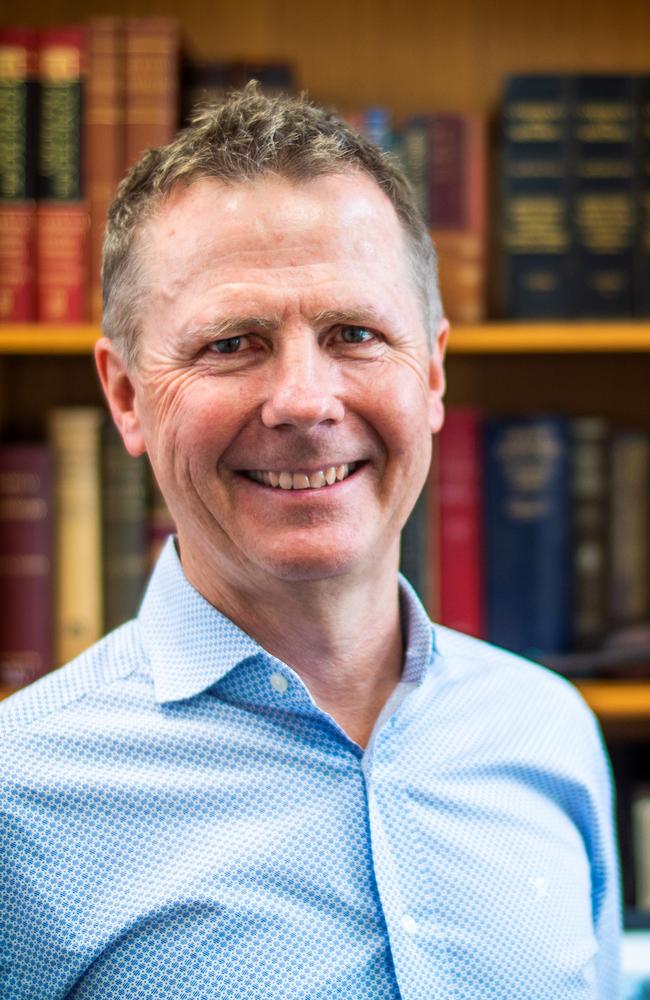
“It’s tragic when anyone is diagnosed with advanced cancer but especially when someone is so young,” he says.
“People talk about ovarian cancer being a silent killer but it is a change in symptoms. Everybody has vague symptoms sometimes – a bit of bloating or pelvic pain or change in bowel habits – but if it is something that is new and it lasts more than, say, three weeks, then see a doctor and it should be examined.”
Jack Kaufusi’s treatment and surgery means she is unable to have any biological children of her own. This was a concept, at age 24, that didn’t affect her too much but, as time went by, she found it more difficult to accept.
But this “void’’ has been filled by a special bond that exists with her two-year-old niece who is named Alisi in her honour.
“My eldest sister, Letele (33) had her fourth baby and she named her after me,” she says.
“It was so overwhelming and we have a special bond. She has filled a void in me.
“At 24, I didn’t really think about having kids because I was still so young but once the option was taken from me, it was hard to process.
“Having little Alisi in my life has given me peace and I’ve been able to come to terms with not having any biological children of my own. It was a special thing to do.”
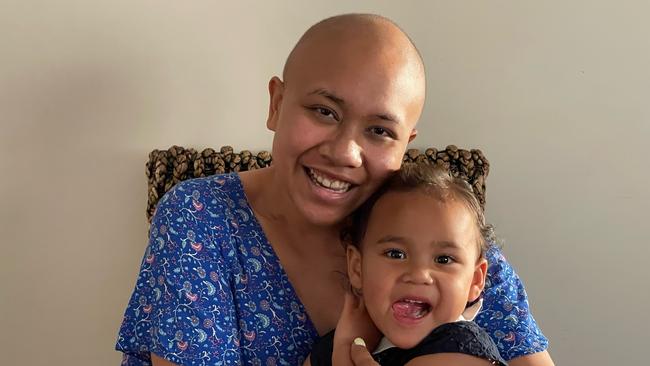
When she was diagnosed, Jack Kaufusi movedback into her family home in Capalaba, south east of Brisbane, with her mum and dad, Lois, 66, and Tevita, 71.
Jack Kaufusi, who has had all her treatment and operations at Mater Hospital, says she is grateful for the hospital’s support of cancer research and happily stands up to be “the voice” of young women with this disease as well as those who have already passed away.
“I am still positive and hope is very important but now I also acknowledge that some days I am not positive, some days I don’t feel like I have the strength, some days I have felt defeated and scared,” she says.
“I find it helps my mental health if I acknowledge that it’s okay to not be okay. I just want to be honest about my whole story.
“While I am still here, while I still have a voice, it’s not just about me. It’s about the women who are no longer here and for future generations of mothers and daughters. I’m speaking out for them too.
“If I can help even one woman, that means I’m doing the right thing.”
You can support the incredible work being done by Mater’s cancer research teams through buying tickets in Mater Prize Home. Tickets from $2 at materlotteries.com.au or call 1800 067 066.
In partnership with Mater Prize Home.
More Coverage





